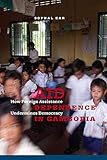Aid Dependence in Cambodia : How Foreign Assistance Undermines Democracy / Sophal Ear.
Material type: TextPublisher: New York, NY : Columbia University Press, [2012]Copyright date: ©2012Description: 1 online resource (208 p.) : ‹B›B&W Photos: ‹/B›1,, ‹B›Graphs: ‹/B›4,, ‹B›Figures: ‹/B›3Content type:
TextPublisher: New York, NY : Columbia University Press, [2012]Copyright date: ©2012Description: 1 online resource (208 p.) : ‹B›B&W Photos: ‹/B›1,, ‹B›Graphs: ‹/B›4,, ‹B›Figures: ‹/B›3Content type: - 9780231161121
- 9780231530927
- 320.9596 23
- DS554.8 .E25 2013
- DS554.8 .E25 2013
- online - DeGruyter
- Issued also in print.
| Item type | Current library | Call number | URL | Status | Notes | Barcode | |
|---|---|---|---|---|---|---|---|
 eBook
eBook
|
Biblioteca "Angelicum" Pont. Univ. S.Tommaso d'Aquino Nuvola online | online - DeGruyter (Browse shelf(Opens below)) | Online access | Not for loan (Accesso limitato) | Accesso per gli utenti autorizzati / Access for authorized users | (dgr)9780231530927 |
Frontmatter -- Contents -- List of Figures and Tables -- Preface -- Acknowledgments -- Note on Confidentiality -- Introduction -- 1. Aid Dependence and Quality of Governance -- 2. Growth Without Development -- 3. An International Problem -- 4. Shallow Democracy -- Conclusion -- Appendix -- Notes -- Works Cited -- Index
restricted access online access with authorization star
http://purl.org/coar/access_right/c_16ec
International intervention liberated Cambodia from pariah state status in the early 1990s and laid the foundations for more peaceful, representative rule. Yet the country's social indicators and the integrity of its political institutions declined rapidly within a few short years, while inequality grew dramatically. Conducting an unflinching investigation into these developments, Sophal Ear reveals the pernicious effects of aid dependence and its perversion of Cambodian democracy.International intervention and foreign aid resulted in higher maternal (and possibly infant and child) mortality rates and unprecedented corruption by the mid-2000s. Similarly, in example after example, Ear finds the more aid dependent a country, the more distorted its incentives to develop sustainably. Contrasting Cambodia's clothing sector with its rice and livestock sectors and internal handling of the avian flu epidemic, he showcases the international community's role in preventing Cambodia from controlling its national development.A postconflict state unable to refuse aid, Cambodia is rife with trial-and-error donor experiments and their unintended consequences, such as bad governance and poor domestic and tax revenue performance-a major factor curbing sustainable, nationally owned growth. By outlining the terms through which countries can achieve better ownership of their development, Ear offers alternatives for governments still on the brink of collapse, despite ongoing dependence on foreign intervention and aid.
Issued also in print.
Mode of access: Internet via World Wide Web.
In English.
Description based on online resource; title from PDF title page (publisher's Web site, viewed 02. Mrz 2022)


